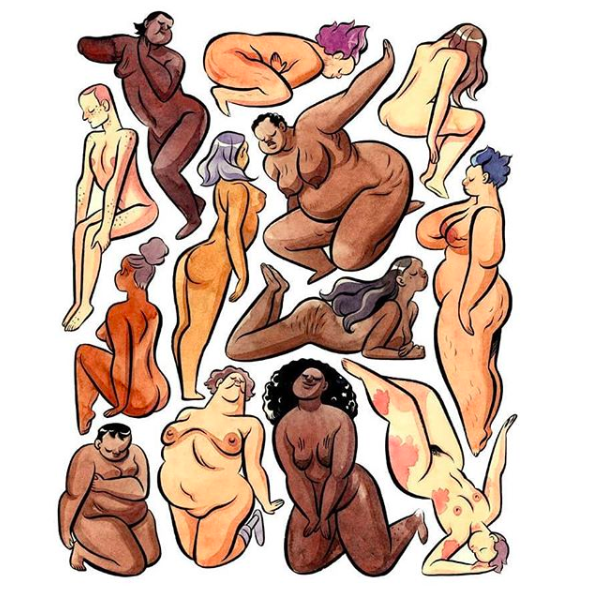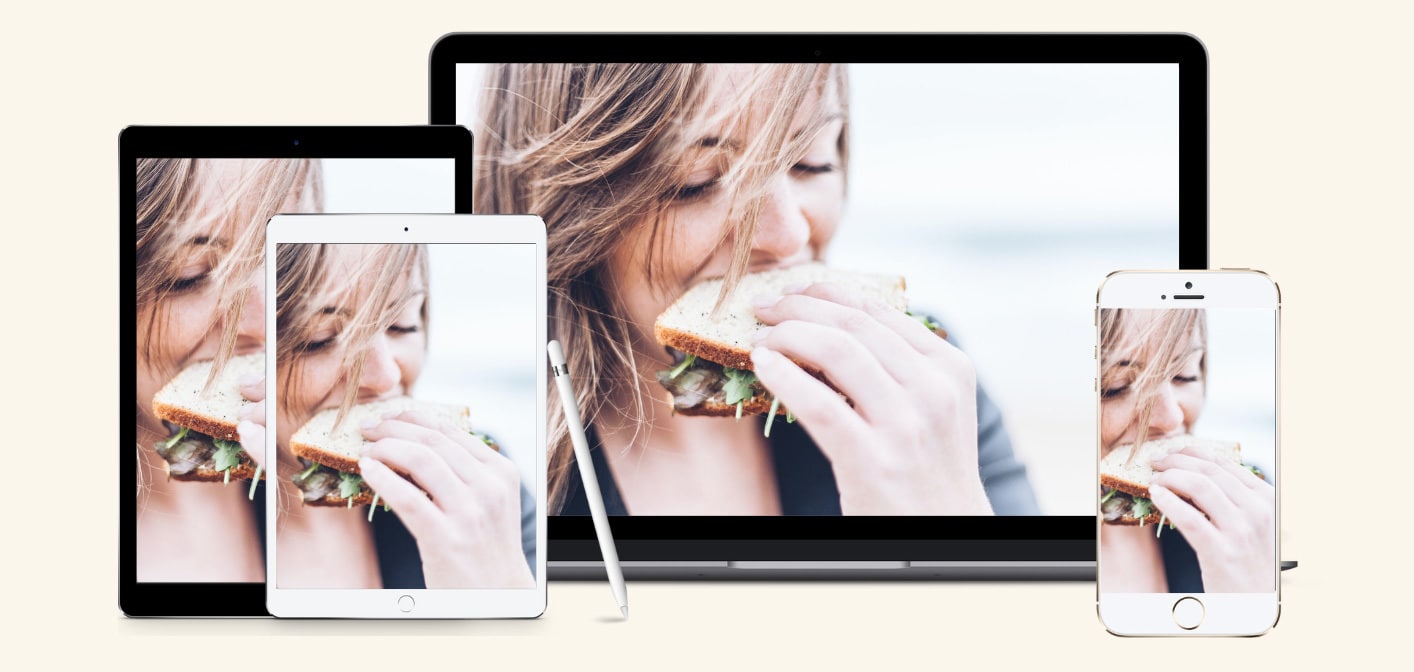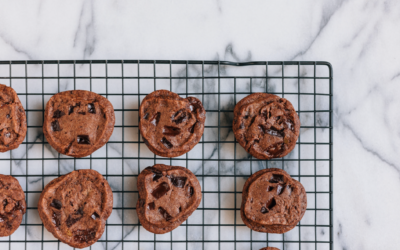“I don’t like the way I look”
“I wish I looked more like X”
“Once I’ve lost weight I will feel more XXX”
“Once I’ve lost this weight I will be able to XXX”
“There’s something wrong with me”
Are these things you hear yourself saying? I can certainly put my hands up to saying some of these things to myself previously.
Nowadays, we live in a society that is more and more obsessed with appearance. Both teenagers and adults are flooded with images of society’s idea of “perfect” bodies. We see adverts of diets co-opted as “lifestyles” designed to “transform and sculpt”, compounding the message that we are not good enough as we are. That we need to shrink or change our bodies to feel more worthy, accepted, happy and to have better health.
As a Registered non-diet Dietitian, specialising in Intuitive Eating, I work with clients to help them heal their relationship with food. Body image work comes into this frequently. This is because many of the food issues my clients experience, are underpinned by them trying to shrink or change their body.

Image by Moose Kleenex
What is body image and why does this matter?
The Mental Health Foundation describe body image as “a term used to describe how we think and feel about our bodies”. As a society, we are becoming more aware of the impact of how we think and feel about our bodies on our health and wellbeing. In fact, just recently the Mental Health Foundation conducted an online survey of 4500 UK adults over the age of 18, and 1100 teenagers (aged 13-19). They found:
- 1 in 5 adults (20%) felt shame about their bodies.
- 34% of adults felt low or down and 19% felt disgusted because of their body image.
- 13% (1 in 8) even experienced suicidal thoughts in relation to body image.
- Just over one in five adults (22%) and 40% of teenagers said images on social media caused them to worry about their body image.
So what is positive body image?
Positive body image doesn’t have to mean floundering around half naked shouting to the world that you love your body (although that’s also totally okay). For most of my clients, it’s about getting them to a place where they are not actually thinking too much about their body image. Where they can be at weddings, parties, events and get involved in other activities without body image holding them back from being present and participating. As a Registered non-diet Dietitian, specialising in Intuitive Eating, I work with clients to help them heal their relationship with food. Body image work comes into this frequently. This is because many of the food issues my clients experience, are underpinned by them trying to shrink or change their body.
Below I have outlined 5 steps you could take today, that may help improve your body image.
5 steps to having better body image
1) Adopt some self compassion
We often find it easy to direct compassion towards a friend, animal or young child who is suffering. Perhaps we feel affected by their suffering, and have a strong desire to help them ease that discomfort. Self-compassion is about directing that compassion inwards to ourselves. Recognising our own suffering, not avoiding or disconnecting from it, and generating the desire to alleviate and heal that suffering with self-kindness (Neff 2003). This may sound a little spiritual, and if you’re not into that, stick with me here. There is some sound research to suggest that adopting some self-compassion may attenuate body image dissatisfaction.
So how can you adopt some self-compassion?
- Quit following #fitspo #fitspiration images on social media, and start following some #selflove and #selfcompassion quotes instead.
- Give yourself permission to be imperfect. After all, there is no such thing as perfect!
- Recognise that you’re not alone – 1 in 5 adults feel shame about their bodies.
- Talk to yourself like you would your best friend that felt dissatisfied with their body.
2) Ask yourself who’s profiting from body hatred?
The diet industry is worth $60 Billion and is profiting from trying to cure you from a problem that really doesn’t exist. How are you fuelling into this and how else could you best spend your money?
3) Get clued up on weight science, and understand that weight does not define your health
This social requirement that we need to achieve an “ideal weight” is based on the misconception that we can completely control our body size. You may be surprised to learn that some of the most basic assumptions you hold about weight and health aren’t supported by scientific evidence. Misconceptions:
- “It’s just calories in versus calories out right?”
- “Surely shrinking your body shouldn’t be so hard, I’ve just not go the willpower”.
- “Thinner = healthier”
Unfortunately, weight is not that simple. We know (and maybe you’ve experienced) that in the short term, weight loss is typically possible. But over the long-term the body has compensatory mechanisms that undermine its ability to maintain weight loss. Health is not dictated to by what the number says on the scales. You can read more about that here
4) Can you show your body some respect?
You may not love or even like your body right now. But for now, how can you show it a basic level of respect? Here are some examples:
- Nourishing it regularly with food that you enjoy
- Wearing clothes that fit you and that don’t pinch
- Taking your medications
- Having regular medical and dental check ups
- Move your body in a way that feels comfortable
- Allow it adequate sleep and rest
5) Notice how diet culture is deeply ingrained in our society
Diet culture is everywhere. It teaches us that we’re not good enough as we are. That we have to live a life of constant monitoring, controlling our bodies, restricting ourselves, and over exercising. It’s not until we open our eyes to this messaging, that we can start to shut it out. Here are some examples of messages that promote negative body image that we are often not aware of:
- The consistent diet advertisements – on Spotify, in the gym, in the doctors surgery, on the train, tube or bus, on TV.
- The casual use of fat phobic language – jokes around the dinner table, in the office, on TV and in films.
- The general assumption that larger people are lazy, lacking in will-power, incompetent, unclean and undisciplined.
- The lack of body diversity in the media.
- Public health campaigns that shout about the “obesity epidemic” and place blame on those people in larger bodies being a “burden” on the NHS. These indirectly stigmatise larger bodies and indirectly contribute to appearance-based bullying.
- The way we talk about food – good/bad/healthy/unhealthy/guilty/indulgent/clean
This work is hard so don’t expect to master is overnight. Consider how many months or years you have you been trying to change or manipulate your body? It’s normal for this work to take some time and it particularly difficult to embrace in a society that’s telling you otherwise. If you’re struggling with your body image it’s important that you seek support from a qualified professional who can point you in the right direction.






